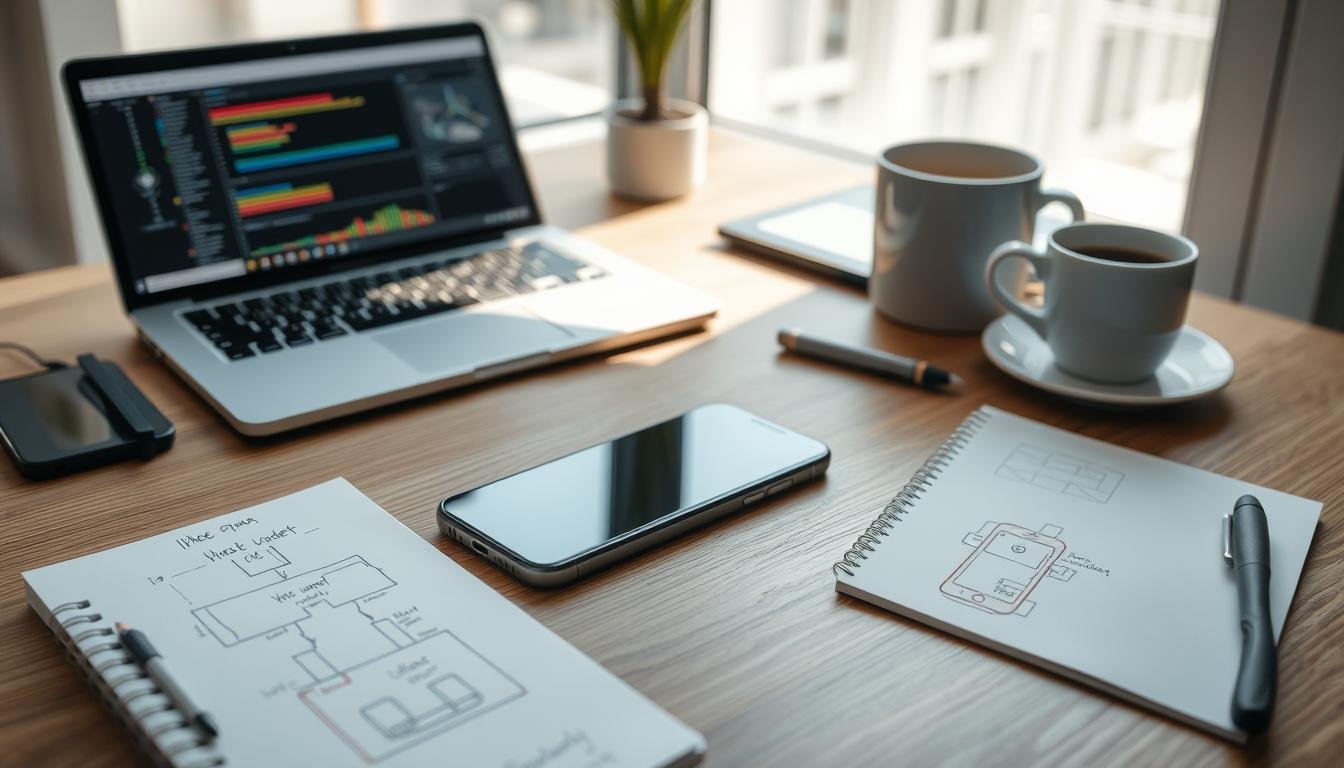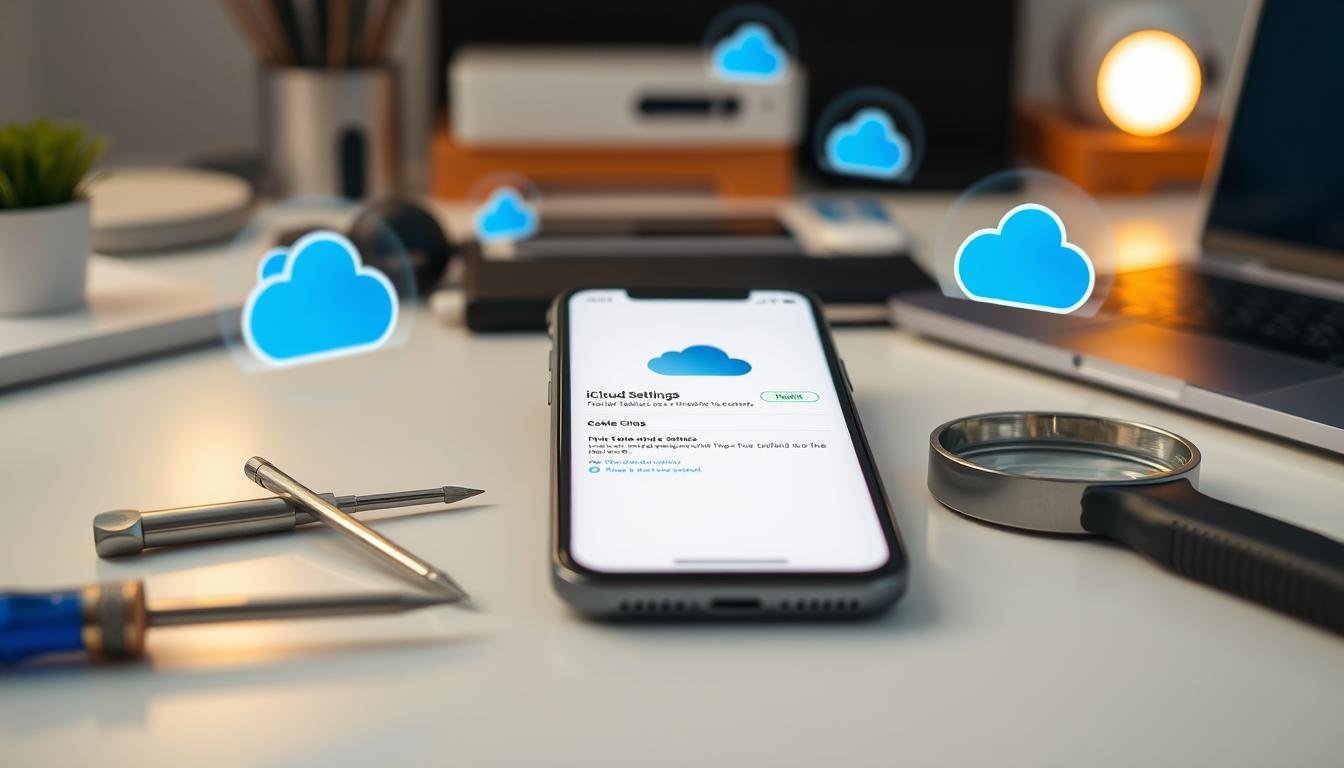Quick Guide to Troubleshooting iPhone Issues

Have you ever found yourself staring at a frozen screen, wondering why your iPhone has suddenly ceased to cooperate?
iPhones are known for their sleek designs and advanced technology. But sometimes, they can be frustrating. Issues like battery drain, software glitches, and connectivity problems can be puzzling. This guide will help you tackle these problems.
We’ll cover typical issues, offer tips for software updates, and discuss when you might need a new battery.
By the end of this guide, you’ll know how to handle many iPhone problems. This could save you from having to go to the repair shop.
Key Takeaways
- Identify common iPhone issues that users frequently encounter.
- Learn quick fixes for software and hardware malfunctions.
- Understand when to consider iPhone repair or battery replacement.
- Discover tips to enhance your iPhone’s connectivity and performance.
- Gain insight into troubleshooting techniques to resolve persistent problems.
Common iPhone Problems and Their Solutions
Many of us face issues with our iPhones. Knowing the common problems can make fixing them easier. I’ll cover iPhone display issues, battery problems, and unresponsive devices. I’ll also share solutions to solve these problems quickly.
Device Won’t Turn On
An iPhone that won’t turn on is frustrating. It might be a dead battery or a software glitch. Try a forced restart to fix many software issues.
Press the Power and Volume Down buttons for ten seconds until you see the Apple logo. If it still doesn’t work, you might need professional help or a new battery.
Battery Draining Quickly
Many iPhone users worry about their battery draining fast. To find out what’s using your battery, go to Settings > Battery. Look for apps that use a lot of power.
If you find any, think about uninstalling or updating them. Turning on Low Power Mode can also help. For sehttps://darrelaffiliate.com/wp-content/uploads/2024/12/vintage-electrical-and-electronic-appliances-in-an-2023-11-27-05-10-10-utc-e1734923695564.jpgus issues, consider getting a new battery.
Screen Freezing or Crashing
Screen freezes or crashes can be a big problem. They often come from old software or not enough storage. Try closing apps by swiping them away.
Updating your iOS regularly can also help. Make sure you have enough storage to avoid future issues.
| Problem | Common Causes | Recommended Solutions |
|---|---|---|
| Device Won’t Turn On | Dead Battery, Software Issues | Forced Restart, Seek Help |
| Battery Draining Quickly | Background Apps, Aging Battery | Check Battery Usage, Low Power Mode |
| Screen Freezing or Crashing | Insufficient Storage, Software Glitches | Close Apps, Update iOS |
By following these tips, you can handle common iPhone problems better. If issues keep happening, you might need a deeper check or repair. For more help with iPhone issues, check out this resource.
Tips to Fix Software Glitches
Dealing with software glitches can be frustrating. Thankfully, there are several effective ways to address these issues on my iPhone. By following a few simple steps, I can significantly improve the performance of my device and avoid unnecessary complications.
Restarting Your iPhone
A quick restart of my iPhone often resolves minor glitches. This simple action resets the software state, potentially fixing many little bugs. I find it reassuring to know that this fundamental troubleshooting step is just a button press away.
Updating iOS
Regularly checking for iPhone software updates is crucial. Apple frequently releases updates to address bugs and improve performance. Staying current with these updates helps prevent glitches from arising. If I come across issues while updating my phone, I refer to Apple’s list of update and restore errors for assistance.
Resetting Settings
When persistent problems occur, resetting settings can be a beneficial option. This process retains all personal data but restores system settings to their defaults. It can assist in resolving configuration errors that might be causing complications. Before diving into a full reset, I ensure that my iCloud storage is in good standing, enabling effective backups post-reset.
Connectivity Issues: Wi-Fi and Bluetooth
Dealing with connectivity problems on my iPhone can be really frustrating. Issues with Wi-Fi and Bluetooth often disrupt my daily tasks. Knowing how to fix these problems makes a big difference.
Troubleshooting Wi-Fi Connection
Here are some steps to fix Wi-Fi issues:
- Restarting Devices: Turning off my iPhone and Wi-Fi router often solves temporary problems.
- Updating Software: I should update my iPhone’s software to avoid connection problems.
- Resetting Network Settings: This is good for ongoing issues, as it resets all network settings.
- Factory Reset: If nothing works, a factory reset might fix deeper problems. But, it will erase all my data.
Bluetooth Pairing Problems
Bluetooth can also cause problems. Here are some fixes:
- Unpairing Old Devices: Removing old devices can solve pairing issues.
- Seeking Professional Support: For hardware problems, I can get help from Apple Store technicians or online Apple Support.
About 36% of iPhone users face Wi-Fi and Bluetooth issues. Some fixes include deleting VPN settings. If problems continue, getting professional help is the best option.
Managing Storage and Performance
Dealing with storage issues on my iPhone can be frustrating. It’s especially true when the system demands more space over time. My iPhone 6s, running iOS 11.2.2, showed all 16 GB of storage was full. The system itself took up a huge 10 GB. Clearly, managing storage well is key to better iPhone performance optimization.
How to Clear Storage
To free up space, I review apps that use a lot of storage. Deleting unused apps is a quick fix, but sometimes it doesn’t work. I also use AirDrop to transfer photos or sync with a computer to save space. For more tips, I found a detailed guide on troubleshooting iPhone storage issues.
Optimizing Performance
Improving performance is just as important as clearing storage. I disable background app refresh for apps that use a lot of resources. I also limit how many apps are open at once. Resetting my iPhone helps solve persistent problems. When my iPhone overheats, I know it’s time to get help from iFixOmaha. They offer a lifetime warranty on parts and labor, keeping my iPhone running smoothly.
| Method | Description |
|---|---|
| Delete Unused Apps | Removing apps that I no longer use can free up substantial storage. |
| Manage Photos | Transferring files to a computer or using cloud storage helps prevent clutter. |
| Limit Background Activity | Disabling background refresh aids in conserving battery and processing power. |
| Reset Settings | A system reset can troubleshoot both storage and performance concerns effectively. |
| Seek Professional Help | For complex issues, a trip to a reliable repair service is often the best route. |
Troubleshooting Camera Problems
Dealing with camera issues can be really frustrating, especially when you’re trying to capture special moments. Common problems include the camera not working or photos not turning out right. Knowing some basic troubleshooting steps can help fix these issues and improve your photography.
Camera Not Working
When the camera won’t start or is not responding, restarting your iPhone is a good first step. This simple action can fix about 99% of electronic problems. If restarting doesn’t work, check the camera permissions in your settings to make sure the app has access.
Try switching between the front and back cameras to see if the problem is with one of them. Testing the FaceTime app can also help figure out if the front camera is working right.
Issues with Photo Quality
Low-quality photos might be caused by dirt or obstructions on the camera lens. Cleaning the lens with a microfiber cloth and screen cleaner can help. Keeping your iPhone’s software up to date can also improve the camera app.
If photos are still not good enough, try using third-party apps like Zoom or Instagram. This can help you see if the problem is with the built-in camera. If all else fails, resetting all settings on your iPhone is a five-step process. As a last resort, a factory reset can work, but make sure to back up your data first.
If you’re still having trouble, it’s a good idea to contact Apple Support for help.
Fixing App Crashes and Freezes
Dealing with app crashes and freezes on my iPhone is really frustrating. It’s especially tough when I need it for work and personal stuff. Finding out why it happens is key to fixing it.
Common reasons include bad internet, old apps, and not enough storage. Fixing these issues usually makes things better.
Updating Apps
First, I check for app updates. Developers often release new versions to fix bugs and add features. Keeping my apps updated helps prevent crashes and gives me new features.
Reinstalling Problematic Apps
If an app still crashes after updating, I try removing and reinstalling it. This can fix problems caused by bad data. About 60% of app crashes can be solved this way, making it a simple fix.
Here are some steps to fix app problems:
- Make sure your internet is stable
- Watch out for low battery
- Free up storage space
- Restart your device
- Remove and reinstall apps with issues
After trying these steps, my iPhone works much better. Regularly checking and fixing these issues helps me avoid crashes and enjoy smoother app use.

Resolving Sound and Audio Issues
Sound problems on an iPhone can be really annoying, especially during calls or when watching videos. Many people struggle with these issues. Knowing what causes them can help fix the problem quickly.
No Sound During Calls
One big issue is when you can’t hear during calls. Weak signals or Bluetooth interference can cause this. To improve your iPhone’s sound, try these steps:
- Check your network signal and move to a better spot if needed.
- Restart your iPhone to refresh everything.
- Turn off Bluetooth when you’re on calls.
- Make sure your iPhone’s software is current.
- Reach out to your network provider if you’re still having trouble.
Audio Playback Problems
Some users face issues like music only playing through headphones or no sound at all. Here’s how to fix these problems:
- Use a brush or alcohol to clean the speaker and remove blockages.
- Turn off Bluetooth and AirPlay to see if they’re causing the problem.
- Make sure Do Not Disturb mode or other Focus features aren’t muting sounds.
- Check the sound settings in third-party apps to make sure they’re right.
- Try restoring your iPhone to a previous backup or resetting all settings if issues continue.
Overcoming iCloud and Backup Issues
iCloud problems can be really frustrating, especially when trying to back up important data. It’s key to fix iPhone issues with iCloud, like sync problems and backup errors. This ensures my data stays safe and easy to get to. Here, I’ll look at common iCloud troubles and how to solve them.
iCloud Not Syncing
If iCloud isn’t syncing, first check your internet connection. A weak or broken connection can stop syncing. Also, make sure your iCloud settings are right. If problems continue, updating your iOS might help with iCloud compatibility.
Backup Errors
Backups can fail for many reasons. Not enough iCloud storage is a big one. Check your storage in iCloud settings and upgrade if you need more. If backups still fail, try a manual backup.
Here are steps and solutions for fixing backup issues:
- Make sure your Apple ID and password are correct for iCloud backups.
- Check your iCloud storage and upgrade if it’s too small.
- Turn off apps you don’t need to find the problem during backup.
- Ensure you have a stable internet connection.
- Look into network settings that might block iCloud backups.
- Try user tips if basic steps don’t work.
Many users face backup problems, but two found success by tweaking settings and creating a better environment. MultCloud also helps manage cloud storage, including iCloud Photos, Dropbox, Google Drive, and OneDrive. It’s useful for moving iCloud Photos to Dropbox, for example.

When to Seek Professional Help
While I often try to fix my iPhone problems myself, there are times when I need professional help. If my phone keeps having issues, especially if it’s physically damaged, I should go to an authorized service provider. Ignoring these signs can make problems worse and cost more to fix.
Signs You Need Assistance
Knowing when to ask for help is important. If my iPhone keeps overheating, has battery problems, or software glitches that won’t go away, I need a pro. Apple has great support resources that can help me figure out what to do next.
Finding Authorized Service Providers
Finding an Apple Store or authorized service provider is easy. I can use Apple’s support site to find certified technicians. They have the right parts and training. Even if my phone isn’t under warranty, getting help can prevent bigger problems and save money.
FAQ
What should I do if my iPhone won’t turn on?
Why is my iPhone battery draining so quickly?
My iPhone keeps freezing or crashing. What can I do?
How can I fix connectivity issues with Wi-Fi or Bluetooth?
What steps should I take to manage storage and optimize performance?
What can I do if my iPhone camera isn’t working?
How do I address app crashes and instability?
Why is there no sound during calls on my iPhone?
What should I do if iCloud isn’t syncing?
When is it time to seek professional help for my iPhone?
Source Links
- https://www.makeuseof.com/tag/iphone-troubleshooting-tips/
- https://support.apple.com/iphone
- https://macpaw.com/how-to/iphone-troubleshooting-guide
- https://thelabrepair.com/blog/top-9-problems-iphones-have-and-how-to-fix-them/
- https://ifixscreens.com/5-biggest-iphone-problems-their-solutions/
- https://serviceplus.co.nz/essential-reading/the-top-7-iphone-common-issues-and-how-to-troubleshoot-them/
- https://www.lifewire.com/fix-iphone-glitch-4583975
- https://chargetech.com/blogs/blog/15-most-common-iphone-glitches-and-how-to-fix-them?srsltid=AfmBOoqV3k4-Qge3dpqW8YAo76CgwiyVP1fWT24JUEhyjKD7n7CDkjzz
- https://www.simplymac.com/iphone/iphone-not-connecting-to-bluetooth-or-wifi-fixes
- https://discussions.apple.com/thread/254883421
- https://discussions.apple.com/thread/8304485
- https://www.ifixomaha.com/blog/common-iphone-problems-and-solutions
- https://www.lifewire.com/iphone-camera-not-working-4177032
- https://www.androidauthority.com/iphone-camera-not-working-3223769/
- https://ifixscreens.com/iphone-camera-not-working-fix-black-screen-problem/
- https://www.makeuseof.com/tag/iphone-ios-apps-keep-crashing-try-fixes/
- https://discussions.apple.com/thread/255763245
- https://discussions.apple.com/thread/254890362
- https://squarerepair.co.uk/blogs/guides/iphone-audio-not-working
- https://discussions.apple.com/thread/4343197
- https://www.multcloud.com/tutorials/icloud-backup-failed-2223-gc.html
- https://support.apple.com/iphone/repair
- https://discussions.apple.com/thread/254482126
- https://www.simplymac.com/iphone/iphone-troubleshooting-guide